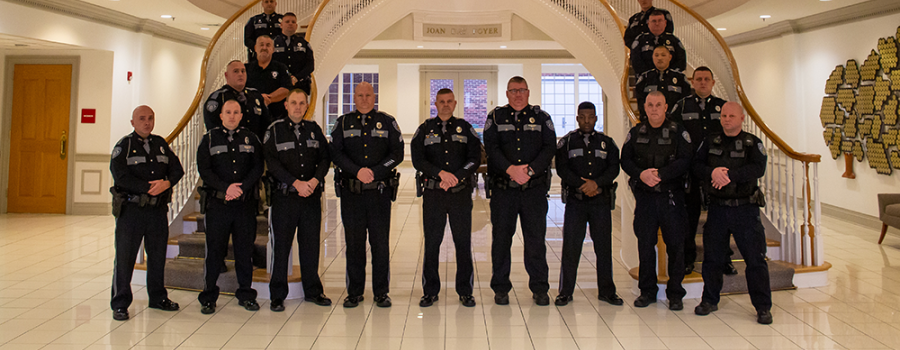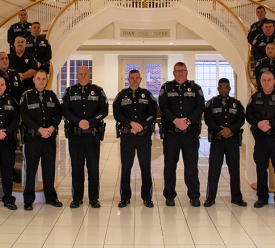Help ensure that justice is served – ethically, responsibly, and consistently.
The bachelor's degree in criminal justice at University of the Cumberlands provides a solid foundation in understanding the criminal justice system and the roles of society and law enforcement, their interactions, and appropriate responses to deviant behavior. Through a curriculum that emphasizes leadership, research, writing, and critical thinking skills, you will be well prepared to become an ethical and effective professional in the field of criminal justice. Whether you're interested in law enforcement, corrections, or other related areas, our program equips you with the necessary tools for success.
By the Numbers
Programs & Requirements
* The credit hours listed on this page only reference the specific program requirements and is not reflective of the total hours necessary to receive your criminal justice degree. Cumberlands requires all students obtain a minimum of 60 hours for an criminal justice associate’s degree and a total of 120 hours for a criminal justice bachelor’s degree. Transfer and prior learning credits may be counted toward those totals.
To learn more about our General Education Requirements, please visit the page referenced below or explore our Academic Catalog.
Bachelor of Science in Criminal Justice
There’s more to law enforcement than just catching the bad guy. If your interests lie in the fields of corrections and justice, you may want to pursue a bachelor’s degree in criminal justice to explore all your law enforcement career options. The expert faculty in University of the Cumberlands' criminal justice degree program will guide you on an educational path toward professional success. This criminal justice bachelor’s degree will teach you what you need to make sure that justice is served – ethically, responsibly, and consistently.
Criminal Justice Transfer Credits:
Officers who have successfully completed the Kentucky Department of Criminal Justice’s Basic Training course (DOCJT) or similar programs from other states are able to receive up to 15 credit hours as Transfer Credit toward completing a Criminal Justice Degree at UC. The academy graduate must currently be employed by a law enforcement agency and be in good standing with their agency. The Officer must first enroll and be accepted as a student in the UC Criminal Justice Degree Program. The Officer must be able to present documentation from the DOCJT verifying graduation and must submit a copy of their Peace Officers Professional Standards Certification. The officer must submit a letter of recommendation from a supervisor within the officer’s department. With appropriate documentation, transfer credits will replace the following courses:
Course Requirements
Complete 9 credit hours from the list of options:
- CRJS 235 - Police Patrol
- CRJS 236 - Probation and Parole
- CRJS 336 - Criminal Investigation
- CRJS 337 - White Collar Crime
- CRJS 401 - Child Abuse Investigation
- CRJS 432 - Criminal Victimization
- CRJS 433 - Juvenile Justice
- CRJS 435 - Death Investigation
- CRJS 439 - Internship and Seminar
- CRJS 490 - Special Topics in Criminal Justice
*With permission of the Department Chair, CRJS 439 and CRJS 490 may be taken twice
Law Enforcement Management
Criminal Profiling
Forensics
A Bachelor of Arts requires all the same courses as a Bachelor of Science with the addition of four classes (12 hours) in a foreign language.
Choose one foreign language sequence:
- FREN 131 Elementary French I
- FREN 132 Elementary French II
- FREN 231 Intermediate French I
- FREN 232 Intermediate French II
- SPAN 131 Elementary Spanish I
- SPAN 132 Elementary Spanish II
- SPAN 231 Intermediate Spanish I
- SPAN 232 Intermediate Spanish II
Associate of Science in Criminal Justice
Similar to an Associate of Applied Science degree program, our criminal justice associate degree prepares you for immediate work within the criminal justice field. Learn the basics you need, finish your degree quickly, and step into a career in criminal justice, ready for whatever comes.
Minor in Criminal Justice
You don’t have to major in criminal justice to help make sure justice is served in the world. Learn the basics of the criminal justice system through a minor at University of the Cumberlands. Understanding more about corrections and justice will come in handy in many ways throughout your life, and it may benefit the lives of those around you as well.
Course Requirements
Take the Next Step
Mission & Goals
The mission of the Department of Criminal Justice at Cumberlands is to provide an understanding of the roles of society and law enforcement, their interactions, and how to respond appropriately to deviant behavior.
Criminal Justice Careers & Outcomes
All stats from U.S. Bureau of Labor Statistics
Police & Detectives: $66,020
Police & Detectives: $66,020
Law enforcement officers protect lives and property. Detectives and criminal investigators gather facts and collect evidence of possible crimes.
Lawyer: $127,990
Lawyer: $127,990
Lawyers advise and represent clients on legal proceedings or transactions.
Private Investigator: $59,380
Private Investigator: $59,380
Private detectives and investigators search for information about legal, financial, and personal matters.
Forensic Science Technician: $61,930
Forensic Science Technician: $61,930
Forensic science technicians aid criminal investigations by collecting and analyzing evidence.
Paralegal: $56,230
Paralegal: $56,230
Paralegals and legal assistants perform a variety of tasks to support lawyers.
Mediator: $49,410
Mediator: $49,410
Arbitrators, mediators, and conciliators facilitate negotiation and dialogue between disputing parties to help resolve conflicts outside of the court system.
Common Questions
A criminal justice bachelor's degree program helps you develop leadership, research, and writing skills while strengthening your critical-thinking skills. The required courses give you the knowledge necessary to succeed in a variety of criminal justice career choices. Upon completing your bachelor’s in criminal justice, you will be prepared to pursue graduate studies or enter the field of criminal justice as an ethical, effective professional.
Yes, because it teaches you the roles of society and law enforcement and how these two entities interact and respond to unacceptable behavior. The kind of knowledge and skills you develop through a criminal justice degree program at Cumberlands will give you an advantage in many different careers, as all industries prize capable, understanding, and problem-solving individuals.
There are many paths you can take with a bachelor’s in criminal justice under your belt. From protective services, to forensic analysis, to legal work, and even teaching criminal justice content to students in high school or college, you will be prepared for a wide range of career options upon completing a criminal justice bachelor’s degree.
Some people want to have a basic knowledge of the criminal justice system without diving too deeply into the field as a college major. At University of the Cumberlands, we offer a minor in criminal justice so that you don’t have to commit to a full major, but you still learn all the essentials about the criminal justice system and how it interacts with society.
University of the Cumberlands is proud to support members and families of the Fraternal Order of Police. We have partnered with the National FOP University to offer members and their families exceptional academic programs that are structured to be some of the most affordable in the nation. FOP members can also apply to University of the Cumberlands free of charge.
Our criminal justice degree program does provide the essential knowledge and skills to become a successful police officer, but there are many more jobs in the field than solely police work. You may pursue a career as a detective, paralegal, mediator, or any number of other positions in the field. No matter your future career, the knowledge and skills you'll gain through a criminal justice bachelor's degree will benefit you throughout your life.
Faculty Experts in Criminal Justice
You don't have to be a detective to learn more about our criminal justice professors. Discover more about them right here!

Dr. Shareeda Tyaire

Melissa Bundy

Dr. Harry Webster
Request Information
Feel the need to investigate a little deeper? Ask us your questions, and we'll send you answers soon!

